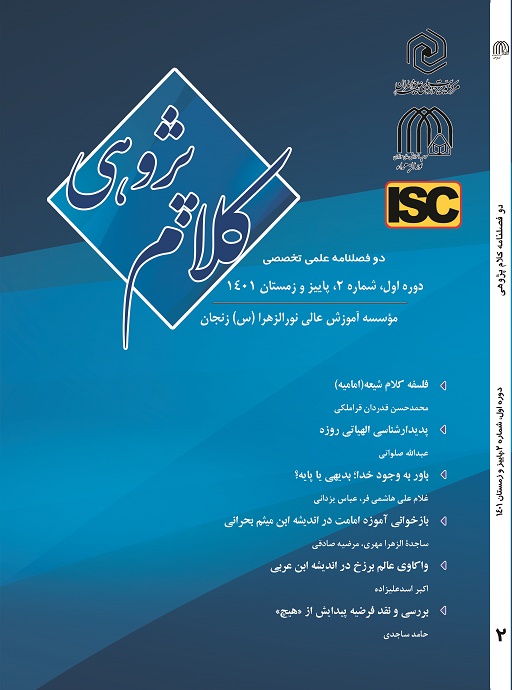تبیین شفاعت بر اساس مبانی انسان شناختی ملاصدرا
نوع مقاله : مقاله پژوهشی
نویسندگان
1 کارشناسی ارشد فلسفه و کلام اسلامی دانشگاه زنجان
2 استاد فلسفه و کلام اسلامی دانشگاه زنجان
چکیده
شفاعت یکی از مسائل بسیار مهم درمیان مسلمانان است و با توجه به آیات به ظاهر متفاوتی که در مورد این مسئله در قرآن ذکر شده، تفسیرهای متفاوتی نیز توسط فرقههای مختلف از آن صورت گرفته است. با این وجود همه فرقههای اسلام آن را پذیرفتهاند اما اختلافاتی در تبیین آن و افرادی که مورد شفاعت قرار میگیرند، داشتهاند. در اندیشه ملاصدرا شفاعت عبارت است از: افاضه نور از حق تعالی که بر واسطهها و جواهر بین او و کسانی که در بعد و دوری از او قرار گرفتهاند، میتابد. وی تلاش کرده است براساس اندیشه فلسفی خود تبیین نوینی از شفاعت ارائه دهد که مبتنی بر اصول و مبانی فلسفی و انسان شناسی دیدگاهش باشد که این مبانی عبارتند از: رابطه واجب و ممکنات و ربط حادث به قدیم، اصل سنخیت، قاعده امکان اشرف، تبیین مفهوم انسان کامل و حقیقت محمدی وتبیین مفهوم ولایت و خلیفه الهی. امتیاز تبیین صدرا از شفاعت نیز همین فلسفی، عقلی و برهانی بودن آن است. سعی ما در این پژوهش بر این است که با روش توصیفی و تحلیلی این مبانی را شناخته و آنها را تبیین نماییم و بر همین اساس اشکالات وارد بر شفاعت را از دیدگاه صدرا بررسی کنیم.
عنوان مقاله [English]
Explanation of Intercession through Anthropological Foundations of Mulla Sadra
نویسندگان [English]
- fatemeh babaee 1
- sahar kavandi 2
1 Master of Philosophy and Islamic Theology, Zanjan University
2 Professor of Islamic philosophy and theology of Zanjan University
چکیده [English]
Intercession is one of the significant subjects among Muslims, and diverse interpretations have been made by different sects due to the seemingly different verses mentioned in the Quran about this issue. Nevertheless, all sects of Islam have acknowledged it, they have had differences regarding its explanation and the people who are interceded. In Mulla Sadra's thought, intercession consists of spreading the light from Almighty God that shines on the mediators and jewels between Him and those who are far away from Him. He attempted to introduce a new explanation of intercession based on his philosophical thought, which is based on the philosophical and anthropological principles of his view, which are: the relationship between requisite and possibilities and the connection of the new to the past [i.e. How the current incident is related to the old cause], the principle of authenticity, the principle of possible highest, the explanation of the concept of the perfect human being and the Muhammadan truth, and the explanation of the concept of guardianship and divine substitute. The advantage of Sadra's explanation of intercession is that it is philosophical, rational, and demonstrative. Our attempt in this research is to identify and explain these basics with a descriptive and analytical method and based on this; examine the problems of intercession from Sadra's point of view.
کلیدواژهها [English]
- Mulla Sadra
- intercession
- perfect human being
- developmental guardianship
دوره 1، شماره 2 - شماره پیاپی 2
بهمن 1401صفحه 145-168
- تاریخ دریافت: 10 بهمن 1402
- تاریخ پذیرش: 10 بهمن 1402
- تاریخ اولین انتشار: 10 بهمن 1402
 کلام پژوهی
کلام پژوهی
